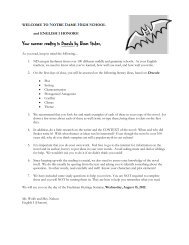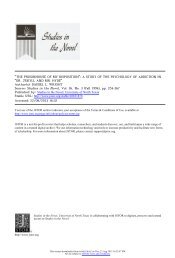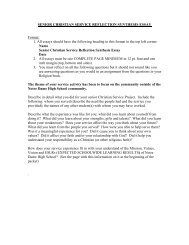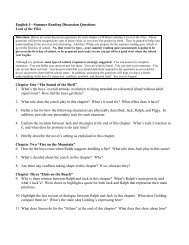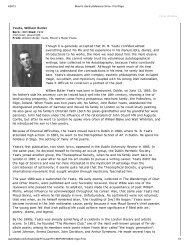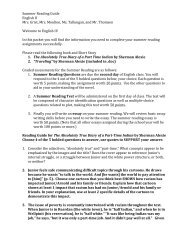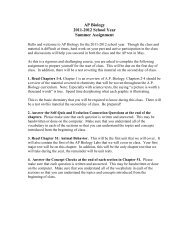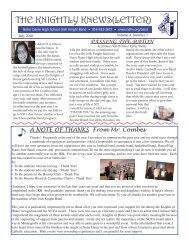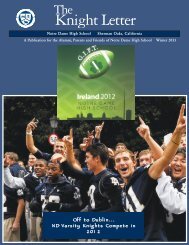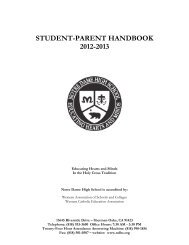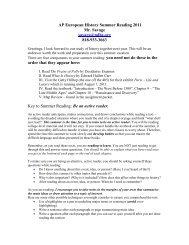Joyce Carol Oates
Joyce Carol Oates
Joyce Carol Oates
You also want an ePaper? Increase the reach of your titles
YUMPU automatically turns print PDFs into web optimized ePapers that Google loves.
The Hudson Review, Inc<br />
Jekyll/Hyde<br />
Author(s): <strong>Joyce</strong> <strong>Carol</strong> <strong>Oates</strong><br />
Source: The Hudson Review, Vol. 40, No. 4 (Winter, 1988), pp. 603-608<br />
Published by: The Hudson Review, Inc<br />
Stable URL: http://www.jstor.org/stable/3851125 .<br />
Accessed: 22/08/2013 16:37<br />
Your use of the JSTOR archive indicates your acceptance of the Terms & Conditions of Use, available at .<br />
http://www.jstor.org/page/info/about/policies/terms.jsp<br />
.<br />
JSTOR is a not-for-profit service that helps scholars, researchers, and students discover, use, and build upon a wide range of<br />
content in a trusted digital archive. We use information technology and tools to increase productivity and facilitate new forms<br />
of scholarship. For more information about JSTOR, please contact support@jstor.org.<br />
.<br />
The Hudson Review, Inc is collaborating with JSTOR to digitize, preserve and extend access to The Hudson<br />
Review.<br />
http://www.jstor.org<br />
This content downloaded from 64.60.146.62 on Thu, 22 Aug 2013 16:37:56 PM<br />
All use subject to JSTOR Terms and Conditions
JOYCE CAROL OATES<br />
Jekyll/Hyde<br />
ike such mythopoetic figures as Frankenstein, Dracula,<br />
and, even, Alice ("in Wonderland"), Dr.-Jekyll-and-Mr.-<br />
Hyde has become, in the century following the publication of<br />
Robert Louis Stevenson's famous novella, what might be<br />
called an autonomous creation. That is, people who have never<br />
read the novella-people who do not in fact "read" at allknow<br />
by way of popular culture who Jekyll-Hyde is. (Though<br />
they are apt to speak of him, not altogether accurately, as two<br />
disparate beings: Dr. Jekyll, Mr. Hyde.) A character out of<br />
prose fiction, Jekyll-Hyde seems nonetheless autogenetic in<br />
the way that vampires and werewolves and (more benignly)<br />
fairies seem autogenetic: surely he has always existed in the<br />
collective imagination, or, like Jack the Ripper, in actual history<br />
(As "Dracula" is both the specific creation of the novelist<br />
Bram Stoker and a nightmare figure out of middle European<br />
history.) It is ironic that, in being so effaced, Robert<br />
Louis Stevenson has become immortalized by way of his private<br />
fantasy-which came to him, by his own testimony, un-<br />
bidden, in a dream.<br />
The Strange Case of Dr. Jekyll and Mr. Hyde (1886) will strike<br />
contemporary readers as a characteristically Victorian moral<br />
parable, not nearly so sensational (nor so piously lurid) as<br />
Stoker's Dracula; in the tradition, perhaps, of Mary Shelley's<br />
Frankenstein, in which a horrific tale is conscientiously subordinated<br />
to the author's didactic intention. Though melodramatic<br />
in conception it is not melodramatic in execution since<br />
virtually all its scenes are narrated and summarized after the<br />
fact. There is no ironic ambiguity, no Wildean subtlety, in the<br />
doomed Dr. Jekyll's confession: he presents himself to the<br />
reader as a congenital "double dealer" who has nonetheless<br />
"an almost morbid sense of shame" and who, in typically Victorian<br />
middle-class fashion, must act to dissociate "himself"<br />
(i.e., his reputation as a highly regarded physician) from his<br />
This content downloaded from 64.60.146.62 on Thu, 22 Aug 2013 16:37:56 PM<br />
All use subject to JSTOR Terms and Conditions
604 THE HUDSON REVIEW<br />
baser instincts. He can no longer bear to suppress them and it<br />
is impossible to eradicate them. His discovery that "Man is<br />
not truly one, but two" is seen to be a scientific fact, not a<br />
cause for despair. (And, in time, it may be revealed that man<br />
is "a mere polity of multifarious, incongruous and independent<br />
denizens"-which is to say that the ego contains multitudes:<br />
multiple personalities inhabit us all. It cannot be incidental<br />
that Robert Louis Stevenson was himself a man<br />
enamoured of consciously playing roles and assuming personae:<br />
his friend Arthur Symons said of him that he was "never<br />
really himself except when he was in some fantastic disguise.")<br />
Thus Dr. Jekyll's uncivilized self, to which he gives the symbolic<br />
name Hyde, is at once the consequence of a scientific<br />
experiment (as the creation of Frankenstein's monster was a<br />
scientific experiment) and a shameless indulgence of appetites<br />
that cannot be assimilated into the propriety of everyday<br />
Victorian life. There is a sense in which Hyde, for all his<br />
monstrosity, is but an addiction like alcohol, nicotine, drugs:<br />
"The moment I choose," Dr. Jekyll says, "I can be rid of<br />
him." Hyde must be hidden not simply because he is wicked<br />
but because Dr. Jekyll is a willfully good man-an example to<br />
others, like the much-admired lawyer Mr. Utterson who is<br />
"lean, long, dusty, dreary and yet somehow [improbably] lov-<br />
able." Had the Victorian ideal been less hypocritically ideal or<br />
had Dr. Jekyll been content with a less perfect public reputation<br />
his tragedy would not have occurred. (As Wilde's Basil<br />
Hallward says in The Picture of Dorian Gray: "We in our madness<br />
have separated the two [body and soul] and have invented<br />
a realism that is vulgar, and an ideality that is void." The<br />
key term here is surely "madness.")<br />
Dr. Jekyll's initial experience, however, approaches ecstasy<br />
as if he were, indeed, discovering the Kingdom of God that<br />
lies within. The magic drug causes nausea and a grinding in<br />
the bones and a "horror of the spirit that cannot be exceeded<br />
at the hour of birth or death." Then:<br />
I came to myself as if out of a great sickness. There was something<br />
strange in my sensations, something indescribably new and,<br />
from its very novelty, incredibly sweet. I felt younger, lighter,<br />
happier in body; within I was conscious of a heady recklessness, a<br />
This content downloaded from 64.60.146.62 on Thu, 22 Aug 2013 16:37:56 PM<br />
All use subject to JSTOR Terms and Conditions
JOYCE CAROL OATES 605<br />
current of disordered sensual images running like a mill race in<br />
my fancy, a solution of the bonds of obligation, an unknown but<br />
not an innocent freedom of the soul. I knew myself, at the first<br />
breath of this new life, to be more wicked, tenfold more wicked,<br />
sold a slave to my original evil; and the thought, in that moment,<br />
braced and delighted in me like wine.<br />
Unlike Frankenstein's monster, who is nearly twice the size of<br />
an average man, Jekyll's monster is dwarfed: "less robust and<br />
less developed" than the good self since Jekyll's rigorously<br />
suppressed life has been the consequence of unrelenting "ef-<br />
fort, virtue and control." (Stevenson's anatomy of the human<br />
psyche is as grim as Freud's-virtually all a "good" man's<br />
waking energies are required in beating back and denying the<br />
"badness" in him!) That Hyde's frenzied pleasures are even<br />
in part specifically sexual is never confirmed, given the Victorian<br />
cast of the narrative itself, but, to extrapolate from an<br />
incident recounted by an eyewitness, one is led to suspect<br />
they are: Hyde is observed running down a ten-year-old girl<br />
in the street and calmly trampling over her body. Much is<br />
made subsequently of the girl's "screaming"; and of the fact<br />
that money is paid to her family as recompense for her violation.<br />
Viewed from without Hyde is detestable in the abstract: "I<br />
never saw a man I so disliked," the lawyer Enfield says, "and<br />
yet I scarce know why. He must be deformed somewhere.<br />
..." Another witness testifies to his mysteriously intangible<br />
deformity "without any nameable malformation." But when<br />
Jekyll looks in the mirror he is conscious of no repugnance,<br />
"rather of a leap of welcome. This, too, was myself. It seemed<br />
natural and human." When Jekyll returns to himself after<br />
having been Hyde he is plunged into wonder rather than remorse<br />
at his "vicarious depravity." The creature summoned<br />
out of his soul and sent forth to do his pleasure is a being<br />
"inherently malign and villainous; his every act and thought<br />
centered on self; drinking pleasure with bestial avidity from<br />
any degree of torture to another; relentless like a man of<br />
stone." Yet Hyde is safely other-"It was Hyde, after all, and<br />
Hyde alone, that was guilty."<br />
Oscar Wilde's equally didactic but far more suggestive and<br />
poetic The Picture of Dorian Gray (1890) makes the disturbing<br />
This content downloaded from 64.60.146.62 on Thu, 22 Aug 2013 16:37:56 PM<br />
All use subject to JSTOR Terms and Conditions
606 THE HUDSON REVIEW<br />
point that Dorian Gray, the unblemished paragon of evil, "is<br />
the type of which the age is searching for, and what it is<br />
afraid it has found." (Just as Wilde's Lord Henry defends insincerity<br />
"as a method by which we can multiply our personalities.")<br />
By contrast Jekyll's Hyde is a very nearly Bosch-like<br />
creature, proclaiming his wickedness to the naked eye as if, in<br />
Utterson's words, he is a "troglodyte ... the mere radiance of<br />
a foul soul that thus transpires through, and transfigures, its<br />
clay continent." One is reminded of nineteenth-century theories<br />
of criminology advanced by C. S. Lombroso and Henry<br />
Maudsley, among others, who argued that outward physical<br />
defects and deformities are the visible signs of inward and invisible<br />
faults: the criminal is a type that can be easily identified<br />
by experts. Dr. Jekyll is the more reprehensible in his<br />
infatuation with Hyde in that, as a well-trained physician, he<br />
should have recognized at once the telltale symptoms of mental<br />
and moral degeneracy in his alter ego's very face.<br />
By degrees, like any addict, Jekyll surrenders his autonomy.<br />
His ego ceases being "I" and splits into two distinct and<br />
eventually warring selves, which share memory as they share<br />
a common body. Only after Hyde commits murder does Jekyll<br />
make the effort to regain control; but by this time, of<br />
course, it is too late. What had been "Jekyll"-that precarious<br />
cuticle of a self, that field of tensions in perpetual opposition<br />
to desire-has irrevocably split. It is significant that the narrator<br />
of Jekyll's confession speaks of both Jekyll and Hyde as if<br />
from the outside. And with a passionate eloquence otherwise<br />
absent from Stevenson's prose:<br />
The powers of Hyde seemed to have grown with the sickliness of<br />
Jekyll. And certainly the hate that now divided them was equal on<br />
each side. With Jekyll, it was a thing of vital instinct. He had now<br />
seen the full deformity of that creature that shared with him<br />
some of the phenomena of consciousness, and was co-heir with<br />
him to death: and beyond these links of community, which in<br />
themselves made the most poignant part of his distress, he<br />
thought of Hyde, for all his energy of life, as of something not<br />
only hellish but inorganic. This was the shocking thing; that the<br />
slime of the pit seemed to utter cries and voices; that the amorphous<br />
dust gesticulated and sinned; that what was dead, and had<br />
no shape, should usurp the offices of life. And this again, that<br />
that insurgent horror was knit to him closer than a wife, closer<br />
This content downloaded from 64.60.146.62 on Thu, 22 Aug 2013 16:37:56 PM<br />
All use subject to JSTOR Terms and Conditions
JOYCE CAROL OATES 607<br />
than an eye; lay caged in his flesh, where he heard it mutter and<br />
felt it struggle to be born; and at every hour of weakness, and in<br />
the confidence of slumber, prevailed against him, and deposed<br />
him out of life.<br />
"Think of it," Jekyll had gloated at the start, "-I did not<br />
even exist!" And the purely metaphorical becomes literally<br />
true.<br />
The Strange Case of Dr. Jekyll and Mr. Hyde, though stimulated<br />
by a dream, is not without its literary antecedents: among<br />
them Edgar Allan Poe's "William Wilson" (1839), in which,<br />
paradoxically, the "evil" self is the narrator and the "good"<br />
self, or conscience, the double; and Charles Dickens' uncompleted<br />
The Mystery of Edwin Drood (1870), in which the Choirmaster<br />
Jack Jasper, an opium addict, oscillates between<br />
"good" and "evil" impulses in his personality with an anguish<br />
so convincingly calibrated as to suggest that, had Dickens<br />
lived to complete the novel, it would have been one of his<br />
masterpieces-and would have made The Strange Case of Dr.<br />
Jekyll and Mr. Hyde redundant. Cautionary tales of malevolent,<br />
often diabolical doubles abound in folklore and oral tradition,<br />
and in Plato's Symposium it was whimsically suggested that<br />
each human being has a double to whom he was once physically<br />
attached-a bond of Eros that constituted in fact a third,<br />
and higher, sex in which male and female were conjoined.<br />
The visionary starkness of The Strange Case of Dr. Jekyll and<br />
Mr. Hyde anticipates that of Freud in such late melancholy<br />
meditations as Civilization and Its Discontents (1929-30): there<br />
is a split in man's psyche between ego and instinct, between<br />
civilization and "nature," and the split can never be healed.<br />
Freud saw ethics as a reluctant concession of the individual to<br />
the group, veneer of a sort overlaid upon an unregenerate<br />
primordial self. The various stratagems of culture-including,<br />
not incidentally, the "sublimation" of raw aggression by way<br />
of art and science-are ultimately powerless to contain the<br />
discontent, which must erupt at certain periodic times, on a<br />
collective scale, as war. Stevenson's quintessentially Victorian<br />
parable is unique in that the protagonist initiates his tragedy<br />
of doubleness out of a fully lucid sensibility-one might say a<br />
scientific sensibility. Dr. Jekyll knows what he is doing, and<br />
This content downloaded from 64.60.146.62 on Thu, 22 Aug 2013 16:37:56 PM<br />
All use subject to JSTOR Terms and Conditions
608 THE HUDSON REVIEW<br />
why he is doing it, though he cannot, of course, know how it<br />
will turn out. What is unquestioned throughout the narrative,<br />
by either Jekyll or his circle of friends, is mankind's fallen nature:<br />
sin is original, and irremediable. For Hyde, though hid-<br />
den, will not remain so. And when Jekyll finally destroys him<br />
he must destroy Jekyll too.<br />
Robert Louis Stevenson died suddenly, in 1894, aged fortyfour,<br />
not of tuberculosis as he'd long feared but of a cerebral<br />
hemorrhage. According to his wife's testimony he had just<br />
come up from the basement of their house when, stricken<br />
with pain, he cried out to her: "What's the matter with me,<br />
what is this strangeness, has my face changed"<br />
This content downloaded from 64.60.146.62 on Thu, 22 Aug 2013 16:37:56 PM<br />
All use subject to JSTOR Terms and Conditions



